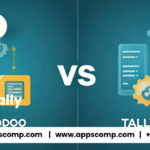
Top 10 Odoo Modules to Boost Your Business
December 3, 2024
Odoo Vs Tally
December 27, 2024When creating a website, you might wonder whether Shopify or WordPress is the better choice. Both platforms are popular, but they work differently. Let’s explore their features step by step to help you decide.
Core Functionality
Shopify is built for e-commerce. It is made to create and manage online stores. It has tools for listing products, managing inventory, accepting payments, and shipping. Everything you need for selling online is included.
WordPress is a general-purpose platform. It can create any type of website, like blogs or e-commerce stores. However, WordPress needs plugins like WooCommerce to add e-commerce features.
Hosting and Maintenance
Shopify includes hosting. This means Shopify manages your website’s servers, security, and updates. You don’t need to worry about technical tasks.
With WordPress, hosting is separate. You need to choose a provider like Bluehost or SiteGround. While this gives you control over your site, it also means you are responsible for maintenance, updates, and backups.
Ease of Use
Shopify is simple to use. It has drag-and-drop tools, making it easy for beginners to set up an online store.
WordPress is harder to learn. You need to install plugins and configure them for e-commerce. This takes more time and effort.
Customization and Flexibility
Shopify offers limited customization. You can use themes and apps, but advanced changes require learning Shopify’s coding language, Liquid.
WordPress is highly flexible. You can use plugins, themes, or even custom coding to create a unique site.
E-Commerce Features
Shopify has built-in e-commerce tools. Features like Shopify Payments, inventory management, and analytics are included. However, there are transaction fees unless you use Shopify Payments.
WordPress uses WooCommerce for e-commerce. It is customizable but needs more setup. Plugins can add payment gateways, shipping options, and more. There are no transaction fees except those from payment gateways.
Scalability
Shopify is scalable with its higher-tier plans. However, you are limited to Shopify’s ecosystem.
WordPress can scale based on your hosting plan. You need to manage your site carefully to handle more traffic.
Which Is Best for E-commerce?
Choosing between Shopify and WordPress for your online store can be tricky. Both are excellent e-commerce platforms but serve different needs.
Shopify is a complete solution with built-in tools and hosting. It’s easy to use and great for beginners. Shopify’s features, like customizable themes and SEO tools, make it popular. However, Shopify pricing plans can be higher. Shopify Liquid customization offers flexibility for design, but advanced features may need expert help.
WordPress, paired with WooCommerce, offers full control. It’s a top choice for flexibility and scalability. But WordPress hosting requirements and setup can feel complex. With WooCommerce plugins, you can create a tailored store.
For small businesses, Shopify vs WooCommerce is a close call. Shopify is simple, while WordPress allows more customization. The decision depends on your budget, skills, and needs.
Research Thoughts
The Shopify vs WordPress comparison focuses on ease of use, cost, and features. For beginners, Shopify offers an all-in-one e-commerce platform with built-in hosting and SEO tools for Shopify. On the other hand, WordPress for e-commerce provides flexibility through WooCommerce and plugins. Shopify vs WordPress for e-commerce often comes down to customization needs and budget. Shopify excels in simplicity, while WordPress shines with scalability. The debate of Shopify vs WooCommerce for small businesses often leans on technical skills. With Shopify’s pricing plans and WordPress hosting requirements, businesses should weigh costs. Both platforms are among the best e-commerce platforms of 2024 but serve different audiences. Choose based on your e-commerce SEO, growth goals, and features like Shopify Liquid customization or WooCommerce plugins.
Cost
Shopify is subscription based; whereas WordPress is based on hosting and plugins.
SEO and Blogging
Shopify has good SEO tools but limited blogging features. For advanced SEO, you might need apps.
WordPress is excellent for blogging. Plugins like Yoast and RankMath give you better control over SEO.
Conclusion
Choose Shopify if you want an easy way to set up an online store. It is perfect for beginners who need everything in one package.
Choose WordPress if you want more control and flexibility. It is ideal for users who can manage hosting and want to customize their site fully.
By understanding your needs, you can decide which platform suits you best.




